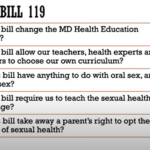
NEWARK – The Worcester County Board of Education voted unanimously this week to oppose a controversial health education bill.
After hearing from citizens both in support of and against the health education legislation known as House Bill 119, the school board unanimously approved a motion to send a letter of opposition to legislators. While public outcry against the bill has focused on aspects of the health framework itself, school board member Bill Buchanan said his motion for opposition was rooted in the fact curriculum should be set by local school systems.
“I’m in agreement with MABE, the Maryland Association of Boards of Education, stance on this bill that it is unnecessary and that it sets a bad precedent for content standards, curriculum and other instructional materials to become the subject of legislation – I’m going to underline – versus the work of local school systems where it belongs,” he said.
Numerous parents and community members attended Tuesday’s Worcester County Board of Education meeting to share their views on House Bill 119, which would require the Maryland State Department of Education (MSDE) to develop a comprehensive health education framework and would have local school systems develop age-appropriate curriculum consistent with that framework. Opponents of the bill, including the Worcester County Commissioners, have criticized it for pushing gender identification and human sexuality onto students too early.
Parent Kate Hulme told the board she supported the bill and an inclusive curriculum.
“I believe strongly that providing an inclusive health curriculum is crucial to our students’ wellbeing both physically and mentally,” she said.
Parent Jackie Cutlip said the bill should be rewritten to force parents to opt their children into the instruction if they wanted their kids to learn it. She quoted from and questioned multiple parts of the framework, which identifies health topics to be taught at various age levels.
“My sixth grader 100% does not need to be told or insinuated that her sex assigned at birth could be wrong,” Cutlip said. “This is insane. These are facts. It’s not wrong. She came out a girl. She is a girl. To make her brain think that there’s another option, anywhere under 18, is so wrong.”
Michelle Abu Zaid urged the board to speak out in opposition to the bill.
“Statewide our children are failing core subjects have an increased dependency on drugs and are developing more behavioral problems,” she said. “This bill will have the effect of leading us further away from our goals of providing a strong core foundation for our students.”
Dr. Margo Gill told the board she was a family physician with several kids in the school system and had reviewed the framework. She said health education was critical, particularly for kids who might not have regular access to health care.
“I cannot tell you the number of people less than 18 who do not understand their bodies and options and how to protect themselves,” she said. “But those are the kids with access. There are hundreds if not thousands of children in our schools who do not have reliable health care access for prevention, education or testing. If we take apart or remove comprehensive health education, we are discriminating against those that are more, and already, susceptible to harm and marginalization.”
Dennis Evans said the bill was part of a disgusting and outrageous agenda. He said it was a parent’s place to teach children about the issues in the health framework.
In a presentation to the board, Tamara Mills, the school system’s coordinator of instruction, said she wanted to dispel some of the myths and misinformation concerning the bill. She said it was critical for adults to understand the need for comprehensive health education in schools. The state’s latest data shows that 44% of high school students on the Eastern Shore reported having sex in the last three months.
“We were more than double nearly every other region in the state,” she said. “The closest region to us was 22%.”
In Worcester County, though the latest data is from 2019, it shows that central and southern Worcester County have some of the highest rates of chlamydia and gonorrhea in the state. It shows that 40% of Worcester County high school students and 7.3% of the county’s middle school students have had sex.
“Folks that is about one in every 14 middle school students,” Mills said.
Of the students who are sexually active, more than 11% of them reported using no form of birth control.
“This is about education,” Mills said.
She told the board the school system had had sexual health in its curriculum for decades.
“That curriculum was not reflective necessarily of our student population as it is today versus 30 years ago,” she said. “All students have a right to a fair and just opportunity to be as healthy as possible. We have an obligation as a school system to ensure this by removing obstacles to health like poverty, access to care, their environment, discrimination.”
In 2019, she said COMAR (Code of Maryland Regulations) changes for comprehensive health education were adopted by the state board of education. In 2021, the state revised and approved the Comprehensive Health Education Framework—the school system’s current standards. COMAR requires that whatever curriculum the school system chooses aligns to that framework.
“Whether the bill is voted down or approved this is still the framework that COMAR requires us to teach, or our curriculum to align with, I should say,” Mills said.
She added that the bill was written in a confusing manner, as the introduction stated that it “would require” school systems to adopt the framework.
“It’s been done since 2021,” she said. “That’s already been done.”
School board member Bill Gordy said that if the framework was already in COMAR it was already in place. Mills agreed and said the bill was simply legislative insurance.
“It would codify what is already educational law,” confirmed Annette Wallace, chief safety and academic officer for grades nine through 12.
School board member Katie Addis said she did not agree with the bill at all.
“We need to continuously ask ourselves who are the parents?” she said. “This is in their wheelhouse, not ours as educators. We need to stick to the reading, the writing, the arithmetic, the science, the history. This is a home base project for at home. There is no reason we need to be talking about oral, vaginal, anal sex in school. There’s no reason for it. None.”
She added that she felt parents should have to opt their children into the program, not opt out as currently proposed.
“Opting out is not really a choice because it puts the entire burden on the parents to make sure they are opting their child out,” she said. “We all know that paperwork comes home, those robocalls are made and life happens and life gets in the way and they forget to do that. And then meanwhile their child is still opted in to this program they might not agree with. In my opinion the whole opt out needs to go away and we need to write a strong letter saying we don’t agree with this and opt out should be changed to opt in if it does in fact pass.”
Addis said she believed the board needed to listen to county residents.
“I can tell you when I walked and knocked on close to 1,000 doors last year this is an incredibly hot topic and this was something a lot of people in my district were very upset about,” she said.
Buchanan said the board of education was nonpartisan.
“When you speak of argument for or against something, and you’re using ‘my opinion,’ ‘I,’ you’re kind of doing a disservice to the seven of us that are here who make decisions for this county and for the students using research, presentations that give us information,” he said. “We discuss it. We form a consensus… I went to these schools. My daughters went to Worcester County schools. My grandchildren are in these schools. So I try to look at issues like this and to think not my opinion, not my personal agenda, but what is right for all kids through consensus.”
Buchanan made a motion to join MABE’s efforts in opposing the legislation, as it set a bad precedent for curriculum to become the subject of legislation rather than a school system concern. The motion passed unanimously, drawing applause from the audience.
“I would also like to make a motion to include in that letter that if that legislation passes that we as Worcester County opt ourselves out of it,” Addis said.
Mills said that was not possible, as it was addressed by COMAR.
Officials thanked Mills for her presentation. School board members Bill Gordy noted that Addis referenced science as something that should be a focus in school.
“Listening to this presentation, I believe much of that framework, if not every ounce of the framework, is based on science,” he said. “There’s a lot of work in that framework. This is not some voodoo. This is not something somebody just made up because they had idle time. That’s based on science.”
School board member Jon Andes told the audience that he was Worcester County’s liaison for the MABE legislative committee and as a member had voted Feb. 13 to oppose House Bill 119. He noted that though the Worcester County Commissioners had voiced their opposition, and asked for the school board’s opposition, to the bill earlier this month, the board couldn’t consider the issue until its monthly meeting on Tuesday.
“Curriculum decisions should be made by local boards of education, and we need as much flexibility as we can to implement the curriculum that makes sense for our students,” Andes said. “What might work in Howard County or Baltimore County or Baltimore City may not work in Worcester County in delivering instruction.”


